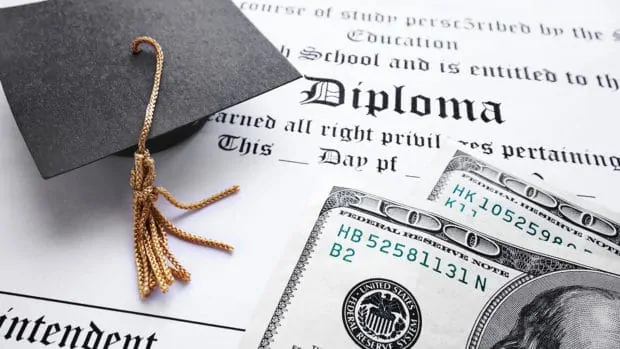Student loans are a common means of financing higher education for many individuals. As a student or a recent graduate, it’s crucial to understand how student loans can impact your credit score. Your credit score is a numerical representation of your creditworthiness, which lenders use to assess your ability to repay debts.
Thanks to student debt, millennials are one financial emergency away from sinking their credit scores.
Sixty-three percent with student loans saw no improvement to their credit score over a year, while 15 percent had a 40-point drop, says a study from credit scoring company FICO. Only 22 percent had a 40-point increase.
FICO VP Ethan Dornhelm calls a 40 point rise or fall in a year a “significant change” in that amount of time. And he puts those with a significant change into two groups: “score increasers” and “score decreasers.”
“What we found when we separated the score increasers from the score decreasers was pretty intuitive,” Dornhelm told Debt.com. “The main characteristics of score increasers was that they were consistently paying their bills as agreed and that they were significantly reducing their amounts owed — they were improving their picture. “
The “score increasers” paid down 28 percent of their credit card balances, while “score decreasers” increased their balances by 78 percent, going from a $3,000 balance on their credit cards to $5,000 on average, Dornhelm says. Interestingly, “score decreasers” had higher FICO scores than “score increasers” on average. The average FICO score for “score decreasers” was 640, while “score increasers” had FICO scores of 575.
To fully understand why some borrowers’ credit is better than others, Dorhlem says you need to understand what makes up a FICO score.
Debt.com can connect you with an accredited student loan relief specialist that can help you review your options.
How do student loans affect your credit score?
There is a close relationship between student loans and credit scores. When you take out a student loan, it becomes part of your credit history, influencing your creditworthiness. A credit history shows your borrowing and repayment behavior over time. Positive credit history, including timely loan payments, contributes to a higher credit score. Conversely, missed payments or defaulting on loans can have a negative impact on your credit score.
There are five key factors that make up your FICO credit score, Dornhelm says. And some factors make up bigger pieces of the pie than others. When it comes to student loans, they have the potential to impact your credit score in several ways. These are the five and how much they affect your score…
1. Payment history: Failure to make timely payments on your student loans can have serious consequences for your credit score. Delinquency occurs when you miss a payment deadline, while default happens when you fail to make payments for an extended period, typically 270 days or more. Delinquencies and defaults can significantly lower your credit score and remain on your credit report for years. It makes up about 35 percent of the FICO score calculation.
2. Amounts owed: Examining the level of debt that the borrower has. It looks at credit cards and other revolving products separately from student loans, mortgages and all other loans. Student loans can influence your credit utilization ratio, which is the percentage of available credit you are using. If you have high loan balances compared to your available credit, it can negatively affect your credit score. Higher levels of debt, higher utilization ratios, correspond to higher risks and therefore are generally lower FICO scores. On the other hand, as you repay your student loans, your overall debt decreases, leading to a lower credit utilization ratio. This can positively impact your borrowing capacity and credit scores. This makes up 30 percent of the score.
3. Length of credit history: The length of experience the consumer has managing credit. Student loan lenders typically report loan information to credit bureaus, which then becomes part of your credit history. This information includes loan balances, payment history, and any delinquencies or defaults. Someone with 20-something years of experience managing credit on their file and paying their bills is going to be rewarded slightly compared to someone who has just recently started using credit. This makes up 15 percent of the FICO score calculation.
4. New credit: How often someone applies for credit. Consumers who apply more frequently for credit are often associated with higher risks. Not a huge driver, but it can be significant for new credit users. Makes up 10 percent of a FICO score.
5. Credit mix: Whether you’re managing credit across a variety of different credit products successfully. Managing both loans as well as revolving credit. The last 10 percent of the score.
6. Debt-to-Income Ratio and Creditworthiness: Although not a factor in your credit score, another aspect to consider is the debt-to-income ratio (DTI). This ratio compares your total debt obligations, including student loans, to your income. Lenders assess DTI to evaluate your creditworthiness and determine if you can handle additional debt. Student loans contribute to your overall debt, and a high DTI ratio may make it challenging to secure new credit or loans.
Get professional help to clean up errors in your credit report.
Student loan repayment options and credit impact
Dornhelm feels that college is a worthwhile investment, but borrowers need to be aware of how much they take out, and know how they’ll pay it back.
“I was in school in the late 90s,” Dornhelm says. “In my 20-something-year-long experience, it’s certainly been eye-opening to see how much costs for an education have increased by. I would mainly emphasize to [borrowers] make sure that they have a plan.”
In fact, Dornhelm says having student loan debt isn’t necessarily a bad thing. Having an active loan is a way to start building credit, which is why it’s crucial for college graduates to learn how their credit works at a young age, and plan for their future finances.
“If they can find a way to pay that back in an on-time fashion consistently over a period of months and years, they will be in a position when they reach those life cycle events like wanting to buy a house, a car, or a home,” Dornhelm says. “Their FICO score will be in good shape as long as they’re managing their revolving debts and keeping them relatively low, not spending more than what they have, and paying their bills as agreed.”
To ensure student loans don’t ruin your credit, it’s important to develop effective strategies for managing them. Creating a budget that accounts for loan payments can help you prioritize and allocate your resources accordingly. Additionally, exploring options such as loan forgiveness programs or refinancing can provide some relief and make repayment more manageable.
Various repayment options are available for student loans, such as standard repayment, income-driven plans, and deferment. It’s important to understand how each option can affect your credit score. Making consistent payments under any repayment plan helps build a positive credit history. However, opting for an income-driven plan or deferring payments may not negatively impact your credit as long as you follow the terms agreed upon with your lender.
Building credit while paying off student loans
While repaying student loans, you can simultaneously work on building your credit. One effective strategy is to establish a solid credit history through responsible credit card usage. By making small purchases and consistently paying off the credit card balance, you can demonstrate reliable repayment behavior and improve your credit score over time.
How does student loan forgiveness affect your credit score?
Loan forgiveness programs are available for certain types of student loans, such as federal loans. These programs can provide relief by forgiving a portion of the loan under specific conditions. However, it’s important to note that loan forgiveness may have implications for your credit score. The forgiven amount may be reported as taxable income, potentially affecting your tax obligations.
FAQs
No, student loans don’t automatically damage your credit score. Your credit score is affected by your repayment behavior and other factors associated with student loans.
Defaulting on student loans can have severe consequences, including damage to your credit score, wage garnishment, and legal action taken by the lender. It’s crucial to explore alternative repayment options if you’re facing financial difficulties.
Learn What Happens If You Can’t Pay Your Student Loans »
Paying off student loans can have a positive impact on your credit score, as it demonstrates responsible debt management and lowers your overall debt burden. However, the impact on your credit score may vary depending on other factors in your credit history.
Student loans typically stay on your credit report for seven years from the date of the first missed payment or the date of default.
Learn How Long Does Information Stay on Your Credit Report? »
Yes, student loans can impact your ability to get a mortgage as lenders consider your debt-to-income ratio when assessing loan eligibility.
Learn 5 Tips for Buying a House With Student Loan Debt »
If you defer student loan payments, it generally does not have a negative impact on your credit score. However, it’s essential to confirm with your lender or loan servicer.
Learn How To Extend Student Loan Deferment »
In certain situations, such as through income-driven repayment plans or Public Service Loan Forgiveness, student loans can be forgiven after a specific period of time and meeting certain requirements.
Learn More About Public Service Loan Forgiveness »
Summary
Student loans can have a significant impact on your credit, but they don’t necessarily ruin it. Responsible management of your student loans, including making on-time payments and keeping your debt-to-income ratio in check, can actually help you build and maintain a positive credit history. By understanding the relationship between student loans and credit, borrowers can navigate the repayment process more effectively while safeguarding their creditworthiness.







